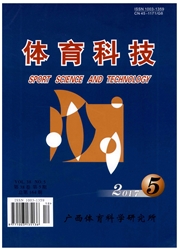

 中文摘要:
中文摘要:
为研究自主运动对慢性应激模型小鼠体重及探索行为、记忆能力的影响,以28只雄性昆明小鼠为研究对象,运用实验法、文献资料法、数理统计法、视频分析法对应激模型组、自主运动组、应激加运动组以及安静组小鼠的体重进行每周记录,并通过旷场试验、迷宫实验监测不同组别小白鼠的探索行为和记忆行为。研究结果表明:(1)四周的慢性应激导致应激组小鼠体重显著轻于安静组;(2)六周自主运动期间,运动组小鼠体重呈下降趋势,而非运动组小鼠体重无明显变化;(3)应激组小鼠在旷场试验中滞留在外周格的时间要长于非应激组;(4)应激组小鼠的迷宫实验结果差于安静组小鼠。结论:(1)慢性心理应激会使小鼠的体重明显下降,这一效应一直持续六周;(2)自主运动能够使小鼠的体重下降,应激加运动使得小鼠体重下降更明显明显;(3)应激后的小鼠探索能力要低于安静组和自主运动组;(4)慢性应激不会对小鼠的记忆能力产生不良影响;(5)本研究结果并没有显示自主运动对小鼠的记忆能力具有促进作用。
 英文摘要:
英文摘要:
In order to study the autonomous exercise on th weight, explore behavior and the memory ability of mice suffered stress, 28 male mice were selected and devided into stress model group, the voluntary exercise group, stress plus exercise group and quiet group, using methods of experiment, literature, mathematical statistics and video analysis, the weight of the mice were recorded, and the exploratory behavior and memory behavior were monitored weekly. The results shows that: 1) chronic stress leads to the body weight of the stress group mice significantly reduce than the quiet group mice; 2) The six-week voluntary exercise cause the weight loss of exercise group mice; 3) In the open field test, the time of the chronic stress group mice stranded outer periphery grid is longer than the non-stressed group; 4) the labyrinth experimental results of the quiet group mice is better than chronic stress group mice.
 同期刊论文项目
同期刊论文项目
 同项目期刊论文
同项目期刊论文
 期刊信息
期刊信息
